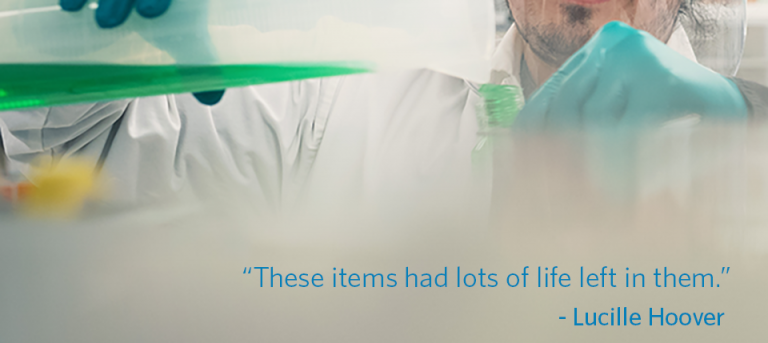
Discarded and surplus laboratory equipment, furniture and supplies from the Department of Psychology have found new lives locally—and in Africa. When the department’s behavioural neuroscience laboratories relocated to the Djavad Mowafagian Centre for Brain Health and UBC Hospital’s Koerner Pavilion, many items not suitable for reuse in the new labs were left behind.
Lucille Hoover, a long-time technician in the labs, knew that most of items could be safely reused or salvaged by others. She began carefully cleaning and categorizing each item. An accumulation of over 30 years resulted in hundreds of items up for grabs including lab equipment, medical and surgical tools, cleaning and office supplies, furniture, hardware, storage containers, and animal cages. With a focus on minimizing waste, Hoover considered the potential re-use of each item and did targeted outreach to find new homes for the items, both on and off campus. UBC faculties and units ranging from Engineering and Zoology—to Childcare Services and Theatre and Film—found new use for the items. See the full list of items that were re-distributed.
It was through UBC’s Green Labs program that Hoover learned of the Korle Bu Teaching Hospital, a neurological training facility in Africa that accepts donated lab and medical equipment. Hoover contacted the Korle-Bu Neuroscience Foundation (KBNF) to arrange for items to be sent though its Shipping with Love to West Africa program. Founded in 2000 by Marj Ratel, a Vancouver-based neuroscience nurse, the KBNF provides medical support for brain and spinal injuries and disease to the people of Ghana and West Africa.
The campus community got dibs on some of the equipment and materials through Reuse It UBC, an online exchange where registered members can post both wanted and available listings. Well-attended ‘garage sales’ were also held in the department. Other items were donated to Habitat for Humanity’s ReStore, a hardware thrift store where proceeds from the sale of the donated goods support the Habitat for Humanity building programs. Animal-care items were donated to Orphaned Wildlife Rehabilitation Society (OWL) and the Wildlife Rescue Association of BC.
“These items had lots of life left in them,” says Hoover, who retired in 2017 after 40 years of service. “Re-directing, and in some cases completely re-purposing these items, saved the recipients money and helped reduce UBC’s environmental footprint. We avoided sending them to a landfill.”
Hoover credits the support from UBC Psychology to further her work in this area. She says “Throughout this endeavor, the department fully-supported my vision for finding new uses for a vast majority of the items from the labs. I appreciated this support.”
UBC has implemented many waste initiatives, from greening our labs to recycling and waste reduction. Find out what you can do to adopt sustainable practices across campus. More
The Department of Psychology also offers recycling resources for batteries, e-waste, soft plastics, and styrofoam. More


